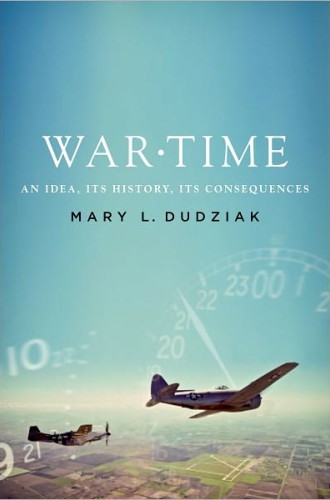War Time, by Mary L. Dudziak
One of the notable features of the Obama administration’s foreign policy has been its disavowal of the locution, if not necessarily the policies, of the “war on terror” declared by George W. Bush in the wake of the terrorist attacks of September 11, 2001. Apparently wary of committing himself rhetorically to a war with no conceivable conclusion, Obama has sustained many of the liberty-averse, antiterrorist practices of the Bush administration, while muting the war word.
This difference might be said to be purely semantic. But semantics can matter a great deal, as historian and legal scholar Mary Dudziak demonstrates in this brief, accessible and provocative study of the idea of wartime in recent American political and legal history.
Read our latest issue or browse back issues.
As we are reminded at least twice a year when we spring forward or fall back with changes in daylight saving time, human timekeeping is a cultural construction. Wartime is one of the most significant cultural constructions of time in U.S. history because it is said to be an exceptional period of time, one in which the balance between the security interests of the state and the rights of individuals shifts decidedly toward the former. Abraham Lincoln could successfully suspend habeas corpus in 1862, but neither his predecessor nor his successor could have done so. Americans tolerate, even welcome, such shifts of emphasis, Dudziak argues, because they know them to be exceptional and, above all, temporary. Such extraordinary abridgments of liberty are, they say, only for the duration of the war, and they are for this reason bearable.
This way of thinking about wartime rests on the perception that there is a clear divide between war and peace. But, Dudziak demonstrates, this divide is a good deal blurrier than it might first appear. Since the mid-20th century, World War II has served as the exemplary instance of wartime, a period clearly bound, for people in the United States, by two dramatic punctuating pairs of events: the bombing of Pearl Harbor and the declaration of war on Japan, and the atomic bombing of Hiroshima and Nagasaki and the Japanese surrender shortly thereafter. However, as Dudziak says, “Even World War II was fuzzier around the edges than we usually imagine.” Well before Pearl Harbor, American ships were engaged in an undeclared naval war with Germany in the North Atlantic, and an official end to hostilities with Germany and Japan was not declared until the early 1950s.
Legally, this fuzziness allowed for some important limiting of civil liberties on the far side of the conventional wartime boundaries of World War II: the Smith Act (1940) criminalizing advocacy of the violent overthrow of the government, and Minersville School District v. Gobitis (1940) upholding a Pennsylvania flag-salute law in the interest of national unity. On the near side, courts wrestled with a number of cases in the late 1940s that rested on a judgment about whether World War II had in fact ended.
Fuzzy distinctions between war and peace are largely the consequence of “small wars” like the suppression of the Philippine insurgency (1899–1913), in which U.S. troops first experimented with waterboarding torture, and which lasted a lot longer than the splendidly brief conventional wartime of the Spanish-American War (1898). Though some of these small wars have managed to escape widespread public notice, they have not, as Dudziak aptly demonstrates, escaped the attention of veterans’ organizations. If a war is defined as a conflict for which a veterans’ organization has awarded a campaign medal, then the United States was at war for nearly the entire 20th century.
Prior to World War II, most American small wars were police actions in Latin America, but with the cold war they assumed global dimensions. Dudziak’s analysis suggests that the cold war was a period in which fuzzy boundaries between war and peace took on the status of a new normal, and a powerful national security state was built to protect it. The term cold war is an oxymoron that captures the twilight zone that the United States entered in this period, though George Orwell’s notion of a peaceless peace is perhaps more apt. The United States fought plenty of wars during the cold war, though none under the constitutional provisions for a congressional declaration of war; a couple of these wars (Korea, Vietnam) were not at all small.
Because the cold war was not a conventional war between nation-states but an uneasy truce shadowed by nuclear weapons and marked by proxy wars on the periphery, it was a most disconcerting wartime by conventional measures. Not least of its peculiarities was the absence of any plausible claim to temporariness. It was a war whose end could be foreseen only as the consequence of a nuclear apocalypse or a domestic revolution.
The cold war made for a more unpredictable relationship between national security and individual rights than conventional wartime did. On the one hand, it framed the repressions of domestic anticommunism in the late 1940s and early 1950s. On the other hand, it provided a valuable context for civil rights activists struggling to secure the liberties of African Americans by supplying a potent argument for ending the racial discrimination that was ill-serving the U.S. in its ideological struggles with the Soviet Union. Dudziak plausibly suggests that fuzzy wartime, because of its fuzziness, is more open than clear-cut wartime to aggressive partisan conflict in which national security concerns are mobilized to divide rather than unify the country.
That the cold war was the setting but not the cause of an era of peaceless peace is evident in the survival of that twilight peaceless state beyond the fall of the Berlin Wall in 1989. Small wars persisted throughout the 1990s—in the Persian Gulf, Somalia, Bosnia and Kosovo.
Following 9/11, George W. Bush openly declared a hot war on terror and thereby attempted to enclose within the parameters of conventional wartime the full-scale attacks on Islamic terrorist outposts worldwide, as well as the wars in Afghanistan and Iraq. The balance between security and rights predictably swung heavily toward the prerogatives of a militarized state. The United States was now invested in warrantless surveillance of its citizens and the torture of enemy combatants.
But Bush’s war lacked the assurance of temporariness. As Dudziak says, the war on terror “was a war against a tactic or an ideology, not a single, easily identifiable entity. And as the boundaries of territory and identity expanded, this conflict also seemed to defy the idea that war was limited in time.” The Supreme Court initially went along with Bush’s efforts to suspend the writ of habeas corpus for the duration of the war on terror, but in 2008 a Court majority held, in Boumediene v. Bush, that there might be good reasons to worry about doing so in a war without conceivable duration—which would be less a suspension than a revocation of the writ.
Barack Obama, heir to the legacy of the cold war Democratic Party, has worked hard and with considerable success to reinstate fuzzy wartime. One might say that his policy has been one of lowering the temperature of the struggle against Islamic terrorism to that of the cold war without relinquishing much of the weaponry developed during Bush’s effort to establish conventional wartime. Obama astutely understands the lessons in fuzzy warfare that the cold war teaches. For example, it is not necessary to invoke wartime to reign in undue liberty; “national security” will often do quite nicely, as it has since 1945. The Court, in Holder v. Humanitarian Law Project (2010), signaled its agreement, upholding on grounds not of wartime but of national security a law criminalizing financial support for even the humanitarian activities of groups designated terrorist organizations.
Hence, the Iraq war is “over,” and the war in Afghanistan is “winding down” toward a quiet occupation. American drones fill the skies of other putatively sovereign nations, and assassinations (even of American citizens) are proceeding nicely. We are well on our way back to the peaceless peace that George Bush and Dick Cheney so recklessly shattered.
Dudziak seems content to warn against the confusion of conventional and fuzzy wartime. We should not permit the latter the latitude we grant to the former, she says. Rather we should understand that fuzzy wartime invites a politics less ready to sacrifice liberty and rights in the name of temporariness. Whatever concessions we make to national security during fuzzy wartime, she suggests, should be a good deal more grudging than those we make during conventional wartime.
But if wartime is a cultural and political construct, so too is fuzzy war. Dudziak is curiously timid about venturing an explanation for how the United States became invested in peaceless peace. However, her charts and tables of veterans’ medals make clear that the United States’ investment in fuzzy war and its quest first for hemispheric and then for global hegemony are tightly correlated.
This correlation points to causation. Early on, Dudziak notes that most small wars over the last century and a half, including those of the United States, have been wars of empire. Peaceless peace is an artifact of the U.S. quest for global hegemony that began during the cold war and has long survived it. Helpful though it might be to cure ourselves of wartime thinking in the midst of unconventional, fuzzy wars, the future of republican liberty would be better secured if we beat a retreat from empire and reestablished a much more modest conception of what our national security requires. An unlikely prospect, to be sure, and one that it would be naive to count on President Obama to pursue.





